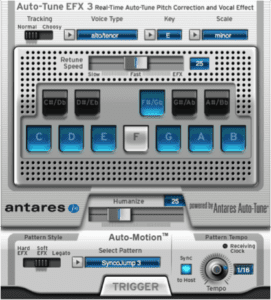It’s time to talk about the facts: your favorite singers don’t sound like that. The voices that you hear on the recordings have been altered to achieve an inhuman level of technical perfection and if you want to get real, most of their “live” concert performances have been pre-recorded and altered too. It’s time that you knew, Charlie.
 It could be argued that this is the musical equivalent of magazines Photoshopping women’s bodies to fit a beauty standard that many women find themselves unable to achieve. But is it ever defensible? And does it mean that your favorite singers sound awful without it?
It could be argued that this is the musical equivalent of magazines Photoshopping women’s bodies to fit a beauty standard that many women find themselves unable to achieve. But is it ever defensible? And does it mean that your favorite singers sound awful without it?
What is Auto-Tune?
The term ‘Auto-Tune’ is used to describe any software that “corrects” the pitch of a recorded sound, by stretching it to match a tempered tone. If I sing a song that was supposed to be in the key of D, but was delivered a little flat or sharp in some places, the software will distort my voice until the only notes that my voice ever hits are notes within the D-major scale. This means a pitch-perfect performance, where every note is mathematically precise.
Its popularity began when it was applied to Cher’s 1998 single “Believe”, to create a robotic vocal effect, but it is used more often today to tune pitchy vocals.
Who Uses Auto-Tune?
Almost every modern singer you hear on the radio today uses the technique. That is to say, the producers that they work with apply pitch correction to their vocal tracks. Occasionally, this is to achieve a modern electronic sound effect, as in Kanye West’s 808s and Heartbreak, or Bon Iver’s Woods, where it is used the same way a guitarist might use a chorus pedal or wah pedal.
Far more often, Auto-Tune is used to correct a sloppy or weak vocal take. Many of the singers currently on the Pop charts can sing well without Auto-Tune, but use it anyway.
Should I Use Auto-Tune?
That’s something that I can’t answer for you. The question you should ask yourself is: why do I want to use Auto-Tune? Is it because the effect enhances the song? Or is it because your vocal performance was flawed?
There’s nothing wrong with the technique, it’s simply a tool. I might argue that if your voice doesn’t sound up to snuff without Auto-Tune, there are probably things you can do in real life to make it better. And I’ll remind you that, while prevalent today, many singers whose voices are considered among the most emotive and soulful in history did not use Auto-Tune, and still managed to stun the world with their performances.
Try to make sure you’re not falling back on any effect as a crutch.
Is Auto-Tune Going to Kill Me?
Only if you are between semitones.
